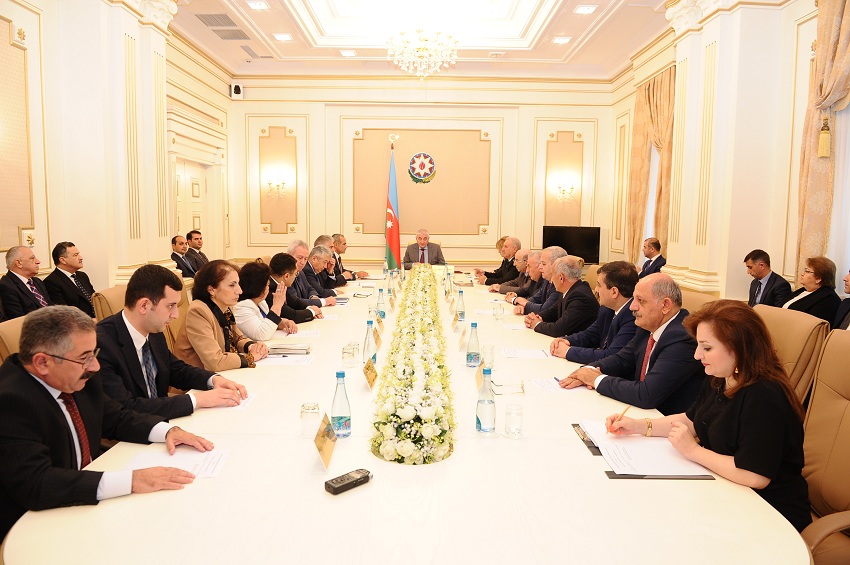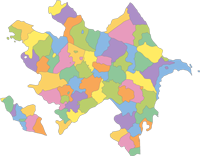Central Election Commission finalized the nationwide voting (referendum)
The Central Election Commission (CEC) held a session chaired by Mr. Mazahir Panahov, CEC Chairman On October 11, 2016. At the session the issue on finalizing the nationwide voting (referendum) held on September 26, 2016 and declaring the final results.
It was mentioned that by Order of President of the Republic of Azerbaijan, dated July 26, 2016, the draft Referendum Act "On making changes to the Constitution of the Republic of Azerbaijan” was put to nationwide vote on September 26, 2016. Basing on the requirements of the election legislation, the process of preparation and conduct of referendum was well-administered, subsequent and systematic as in compliance with the Calendar Plan for the basic activities and measures on the preparation and conduct of the nationwide voting (referendum), approved by the CEC. After the referendum has been appointed, the voters’ lists posted in the election precincts to make updates within the timeframe defined by law to guarantee voters their active election rights had been compiled and publicized as permanent lists on the country since the beginnings of the year, commissions and relevant bodies undertook broad and inclusive activities, thereby compiling the lists very efficiently and posting on the website of the Central Election Commission. A number of activities were undertaken for voters to get familiarized with the issues put to referendum, the draft Referendum Act was officially published and posted on the websites of the Presidential Administration of the Republic of Azerbaijan, Central Election Commission and many other bodies.
After a short period of declaring referendum by the Central Election Commission the draft Referendum Act was compiled in comparative form with the existing version of the Constitution for the issues put to referendum to be more clear and understandable for voters and distributed to the addresses of voters by lower election commissions within the earlier period than 30 days as implied in law – since nearly 45 days prior to the voting day, thereby providing wishing people with free access in the polling stations. These documents useful in simplifying the voters’ choices on the voting day were also distributed in densely-populated areas and demonstrated as video clips regularly in different TV and radio channels, as well as electronic boards installed in public places. Posters in 40 types on different subjects concerning the date of referendum and the voting rules were published and demonstrated in the all residential areas, therewith, 7 advertising videos on similar topics were played on different TV and radio channels regularly on daily basis including the voting day.
During the preparation and conduct of referendum the Central Election Commission implemented a broad educational program on a number of necessary subjects and hundreds of speeches of the Commission members and officials of Secretariat in this field were allocated mush space in mass media. Various conferences, also regional seminar-conferences and professional courses on election right that embodied more than 33 thousand members of the election commissions in the republic were conducted, inter alia, trainings involving the computer operators dealing with the state automated information system at the Constituency Election Commissions were organized. A great number of instructions, rules, comments and other normative acts adopted by the Central Election Commission were published in collection, distributed to lower election commissions and publicized via press and internet. Meanwhile, the interested persons were provided with free access to the materials.
The Central Election Commission registered 3 referendum campaign groups entitled to conduct campaign in the country, which covered broad electorate. Those groups that played an important role in broad and detailed discussion of the draft Referendum Act were provided with equal and wide opportunities to campaign in favor or against the issues put to referendum in a manner defined in legislation. Thus, the TV and radio broadcasting organizations and periodicals implied in legislation allocated free airtime and publication space, also 33 media outlets allocated payable airtime and space for publication. The information sent to the Central Election Commission by the TV and radio broadcasting organizations, periodical editorials and electronic media outlets allocating, concerning the payable airtime and space for publication was posted on the official website of the Commission for campaign groups and other interested subjects to get familiarized with. Pursuant to the Election Code and Law of the Republic of Azerbaijan "On the freedom of assembly”, referendum campaign groups were allocated, in general, 256 venues, half of them being indoor and half of them outdoor in the towns and districts of the republic to meet with voters, therewith they were also provided with more than 10 thousand special billboards to locate posters and other publication materials during the pre-referendum campaign period. Having started from September 3, 2016 to September 25, 2016, the campaign process was held in the atmosphere of modern standards. During that period essential activities were undertaken to raise awareness of voters and clarify the issues put to referendum. Campaign groups distributed nearly 35 thousand posters and other 10 thousand publication materials with the text calling voters to vote for or against the draft Referendum Act on the changes to the Constitution and held about 1500 meetings with voters in campaign period.
The referendum caused great interest of the wide publicity. The voting process was held in free, fair, transparent and open atmosphere in compliance with legislation through the observation of more than 53 thousand local observers by different political parties, non-governmental organizations, referendum campaign groups, also on own initiatives, 117 international observers from 33 countries, a number of representatives of 16 competent international and local media outlets, as well as broad monitoring with webcams installed in 1000 election precincts covering the whole territory of the country (nearly 20% of the polling stations where the voting was held). Internet users could monitor all the processes in the polling stations on the voting day since the beginning till the end throughout the CEC website without any requirement of registration.
As an additional medium to ensure transparency, four organizations held "exit-poll”, four of which implemented their functioning jointly with competent international organizations and the results of the "exit-poll” almost matched with the official results of CEC. By assessing referendum as a legitimate process in full compliance with the national legislation, therewith, underlining the fact of not detecting any law violation that could affect the results, the Parliamentary Assembly of the Council of Europe supported the same stand with other local and international observers who had estimated the referendum as positive.
All necessary activities were implemented, material and technical facilities of election precincts were improved to hold the voting effectively. All the polling stations were opened in time, voters expressed their will freely and independently on the voting day and the referendum with 69.70% voter turnout was valid. A few inquiries filed to the Commission hotline # 115 and electronic hotlines by voters on the voting day regarding the addresses of the polling stations, voter lists and other related issues were immediately responded to and relevant steps were put forward effectively.
After the voting ended and voting results on the polling stations were tabulated, the protocol information on the voting results entered the internet as "online” in more than 70% of the polling stations was announced by the Central Election Commission immediately as preliminary results at the end of the voting day. In the first half of the day the Central Election Commission conveyed preliminary voting results to the public basing on the protocol information of all election precincts in the country.
The voting results protocols on the election constituencies together with the attached documents were submitted to the Central Election Commission within 2 days after the voting day as implied in law and the documents, as well as other relevant materials were investigated fully, thoroughly and fairly within the timeframe and manner defined in the election legislation.
Due to the unfeasibility of determining voters’ will and incomplete abidance by the voting procedures in some polling stations, legal grounds were found out to invalidate the voting results fully in 3 polling stations, partly in one polling station and generally, to dismiss 6 Precinct Election Commissions. Due to accurate determination and tabulation of the voting results on other election constituencies, CEC decided to finalize referendum, declare the referendum results and publish the text of the act adopted by referendum.
The meeting was attended by representatives of international organizations and mass media.
Media and
Public relations department
CEC Secretariat





